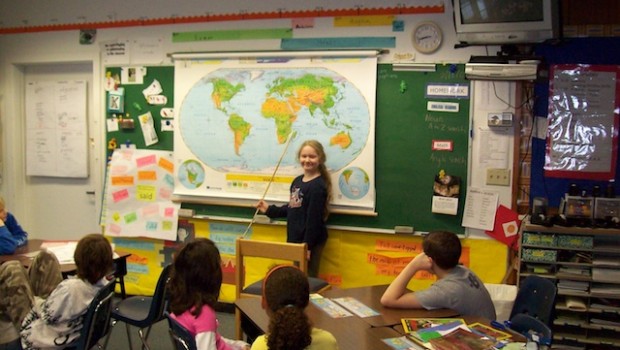Thelma Adams on DEATH VISITING A FOURTH GRADE CLASS
When I spoke to my daughter Lizzie’s fourth-grade class, I asked the kids what they wanted to be when they grew up. “I want to be a professional polo player,” said Colin. His answer shocked me since his late mother, Brooke, had died playing polo two months before. A lanky blonde, he looked just like her.
It seemed surreal that a fellow mother my age had fallen so abruptly. Lizzie had come home in February with a garbled story that turned out to be true: Colin’s mother had been gravely injured while playing polo. Brooke had been competing in a match when a teammate’s horse collided with her own. Her mount stumbled and rolled over her head.
I coped with Brooke’s sudden death by placing Lizzie between me and the loss. I tended my daughter’s emotions, avoiding mine. With Lizzie, I had been gentler than I was with myself, allowing her to cry on my lap, in my arms. I stroked her Goldilocks curls, smoothed her brows, although when she called Brooke her “second mother,” I’d felt a jealous twinge.
I admit it disturbed me that Lizzie attended a school where a mother died playing polo. When we moved to Upstate New York after years in Brooklyn, we switched Lizzie to private school for the academics.
I could hear my Jewish grandmother’s superstitious lore: Relatives all the way back to the shtetl would have avoided horse competitions as too dangerous. But Brooke was a WASP, thinner, richer and more athletic than me, yet I had embraced her as a friend (even if I hadn’t completely shelved my envy).
Brooke had been the thoroughbred of mommies. A handsome horsewoman, she was tall, lean, androgynous. She had a big personality, but noticed small things: she gave me British chamomile ointment for Lizzie’s chapped lips and, six months later, sent me another tube in case I’d run out. Brooke had a kinship with my spirited girl who was welcomed by the boys, yet shunned by the alpha girls.
I enjoyed visiting Brooke’s house, seeing it through the HGTV’s House Hunters lens, a mountaintop estate with a guest bunkhouse larger than most Manhattan apartments. And I’d tagged along with Lizzie on Halloween when Brooke held a glow-stick and shepherded a pack of children from house to house and across the village green, as Colin ran wildly ahead. But I never merged into her larger social circle: my people don’t do polo.
By fourth grade, I rarely saw Brooke. On weekends she played polo in Palm Beach County, before decamping entirely for the winter season. I saw her one last time during a class holiday party. Amid the smell of paste and peppermint, she threaded through the throng to kiss me. That was that: a genuine connection, as if in parallel lives we were best friends.
My first reaction to Brooke’s fatal accident was visceral: disgust. I couldn’t assimilate a loving mother taking such physical risks. My second was research: I discovered that some consider polo the second most dangerous sport behind auto racing. When riding a half-ton horse galloping 35 miles per hour, the frequency of injuries is matched by their severity.
Both reactions were deflecting mechanisms. By this time, I had buried a father, a grandmother, and a mother-in-law. I thought I’d learned how to cope with loss but mourning is a master class with a twisted syllabus.
In March, Lizzie and I attended Brooke’s memorial service. The central theme was that Brooke had died for her passion, as she had lived. I pulled Lizzie closer but my eyes were dry: I was still seeing the event through outsider’s eyes, judging not feeling.
It was months later on Halloween before I saw Colin again. I was standing at the door of a friend’s house, distributing candy while she chaperoned our girls around the neighborhood. Colin approached wearing jodhpurs and riding boots, a mallet in one hand and a goody bag in the other. I couldn’t believe his father allowed Colin to wear a polo costume. The boy would only recall Brooke’s death at every house he visited. The shonda!Colin reminded me of Brooke. It hurt. I wanted to look away but couldn’t. And I realized I needed to dismount from my high horse.
I now understood Colin’s costume, although the underlying culture couldn’t have been more alien. Polo was an elitist sport — but it wasn’t for wimps. If a polo pony crushed your mother during a match, you’d saddle up, take her place and ride.
I dropped a Snickers into Colin’s bag, then added two more and patted his fair hair. He shook off my hand, receding into the darkness, swinging his mallet, racing across the lawn to the next house.








